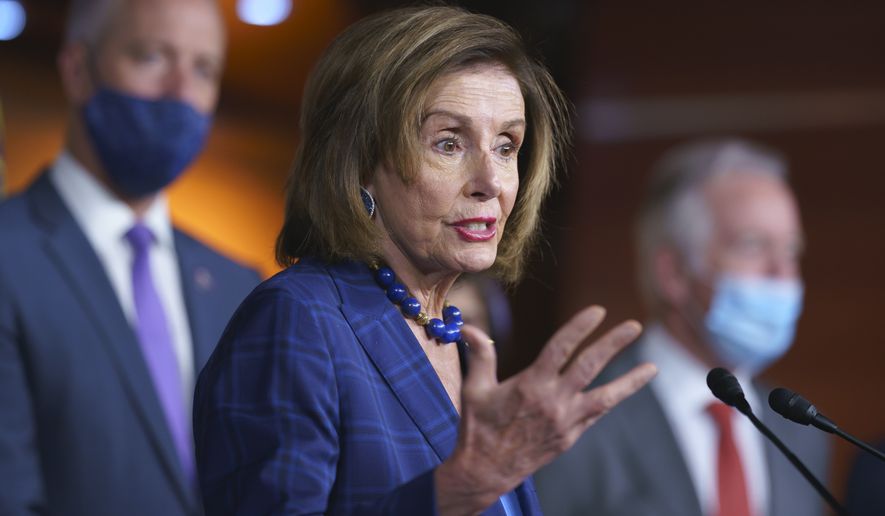House Speaker Nancy Pelosi was poised to force an initial vote Monday evening on President Biden’s $3.5 trillion expansion of America’s social safety net, gambling that the president’s arm-twisting tactics were sufficient to bring a cadre of moderate Democrats to heel.
Led by Rep. Josh Gottheimer of New Jersey, the moderate Democrats were refusing to support advancing the package, which is set to pass along party lines.
Instead, they argued that the House should take up Mr. Biden’s $1.2 trillion infrastructure deal, which passed earlier this month with a large bipartisan margin.
“Like the rest of America, we have waited far too long for legislation that will actually fix our nation’s infrastructure,” Mr. Gottheimer said. “That’s why the House can’t afford to wait months or do anything to risk passing the historic infrastructure package.”
Mrs. Pelosi, California Democrat, has refused to meet the demands. She says the Senate must pass the larger package before the House votes on infrastructure.
“Any delay to passing the budget resolution threatens the timetable for delivering the historic progress and the transformative vision that Democrats share,” Mrs. Pelosi wrote in a letter to her conference. “In support of President Biden’s vision to Build Back Better, we must move quickly to pass the budget resolution this week.
The moderates, most of whom hail from House districts that will be prime pickup opportunities for Republicans next year, say the move amounts to extortion.
Divisions between the moderates and party’s liberals, who also have threatened to withhold their votes if they don’t get their way, have even forced Mr. Biden and senior administration officials, including members of the Cabinet, to make personal entreaties to moderate Democrats on the $3.5 trillion package.
In private phone calls, administration officials argue that Mr. Biden “cannot afford to lose” a vote in Congress given the imbroglio in Afghanistan.
“The calls have intensified in recent days,” said an aide to one of the targeted House members. “We’ve heard every single argument imaginable coming from the president’s top domestic policy adviser to Cabinet secretaries.”
In each of the conversations, White House aides have pressured Democratic lawmakers to unite behind the “leader of their party.”
In an attempt to pressure moderates into backing the reconciliation vote, Mrs. Pelosi upended the scheduled order of business for Wednesday.
Rather than having lawmakers vote individually on a budget resolution to kick-start the reconciliation process, the speaker opted to hold a vote on a vague and ambiguous congressional ruling.
In essence, by voting to pass the rule, lawmakers advanced the budget resolution and election overhaul measures long favored by Democrats.
“If we don’t do this tonight, we don’t come back here until” Sept. 20, said Rep. James McGovern, Massachusetts Democrat and chairman of the House Rules Committee. “That means all that time, our committees aren’t working. We will work this out, but we have to get this process to begin tonight.”
The moderates warned in a Washington Post op-ed over the weekend that “time kills deals.”
“The challenge we face right now is that there is a standoff with some of our colleagues who have decided to hold the infrastructure bill hostage for months or kill it altogether if they don’t get what they want in the next bill — a largely undefined $3.5 trillion reconciliation package,” they wrote in reference to demands from the Congressional Progressive Caucus.
Democrats have dubbed the $3.5 trillion bill “human infrastructure” in hopes of making it an easier sell to voters.
The legislation amounts to a wish list of liberal priorities on such matters as climate change, amnesty for illegal immigrants, tuition-free community college and expanded health care.
It would be funded by higher taxes on the wealthy and corporations.
Because the $3.5 trillion package is unlikely to garner Republican support, Democrats plan to pass it in the Senate via budget reconciliation.
The process allows some spending measures to avoid the Senate’s 60-vote filibuster threshold and pass with a simple majority of 51 votes.
Likewise, in the face of solid Republican opposition in the House, Mrs. Pelosi can have no more than three defections if the legislation is to succeed.
At the moment, liberals also are threatening to buck. The 98-member Congressional Progressive Caucus has said the legislation does not go far enough on climate change or social issues.
“This is the path forward: We’re passing the bipartisan infrastructure bill alongside the jobs and families package,” said Rep. Pramila Jayapal, Washington Democrat and the caucus chair. “These necessary investments are what the people overwhelmingly want.”
Many on the far left are also distrustful of moderates. They say the centrists will not vote for reconciliation once the infrastructure deal is secured.
The liberals are backing Mrs. Pelosi and even threatening to withhold their support from the infrastructure deal unless the reconciliation package moves forward first.
Mrs. Pelosi and other House leadership members have been working to end the standoff, with little success.
“We need to trust one another,” said House Majority Leader Steny H. Hoyer of Maryland. “This is mutually assured destruction.”
Shortly after the Biden White House got involved, Mrs. Pelosi promised the moderates that if they voted for the reconciliation package she would shepherd the infrastructure bill through Congress no later than Oct. 1 — the date the legislation is meant to go into effect.
Those calls, however, seemed to have made little difference. Shortly before the House was to convene Monday, Rep. Stephanie Murphy, Florida Democrat, joined the moderates in demanding a stand-alone infrastructure vote.
• Haris Alic can be reached at halic@washingtontimes.com.




Please read our comment policy before commenting.